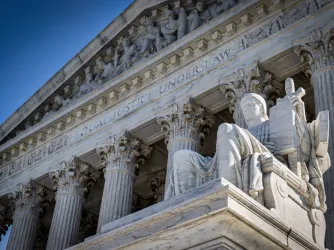Table of Contents
REPORT: Free speech is the missing variable in MIT’s equation

- More than half of MIT faculty oppose the school’s decision to disinvite Dorian Abbot.
- More than 40% of faculty believe it is unclear that the administration protects free speech.
- 38% of faculty say the administration wouldn’t have a speaker’s back in a controversy.
- 46% of MIT students are uncomfortable discussing affirmative action.
- More than three-quarters of MIT students think it’s acceptable to shout down a speaker, and more than half agree it’s acceptable to physically block students from attending a speech.
CAMBRIDGE, Mass., Jan. 19, 2023 — It’s been 16 months since the Massachusetts Institute of Technology disinvited scientist Dorian Abbot from delivering a lecture due to his opposition to campus diversity, equity, and inclusion initiatives. But a new report shows that the school’s disinvitation of the geophysicist is just the tip of the iceberg of its problems with academic freedom and free expression.
According to the report by the Foundation for Individual Rights and Expression, students and faculty at MIT want the administration to protect their academic freedom and foster a culture of free expression. Until improvements are made, the reign of self-censorship, speaker disinvitations, and coerced speech will continue.
“MIT faculty want to explore uncharted — even forbidden — territory,” said Komi Frey, director of faculty outreach at FIRE. “To do so, they need the administration to explicitly, unequivocally defend their academic freedom even when small yet vocal groups demand censorship. Otherwise, MIT students will learn illiberalism when they could have learned innovation.”
FIRE surveyed MIT faculty and found that 52% disagree with the decision to disinvite Abbot. Furthermore, the report finds that students and faculty self-censor in alarming numbers, and that the administration is to blame for this chilling effect:
- 32% of students and 41% of faculty agree that the administration’s stance on free speech is not clear.
- 41% of students and 38% of faculty believe that the administration wouldn’t defend a speaker’s rights during a controversy.
- From 2006-2020, MIT oversaw a 38% increase in untenured faculty, compared to a 10% increase in tenure/tenure-track faculty, suggesting an erosion of tenure (and academic freedom) at the university.
- Three-fifths of faculty say the administration shouldn’t punish professors who oppose diversity training and DEI initiatives — but the MIT Working Group on Free Expression, created by the administration, found it acceptable to deny a promotion to a teacher who criticized such initiatives.
- About one-quarter of faculty are “very” or “extremely” likely to self-censor at work.
The MIT Free Speech Alliance, directed by former FIRE staffer Peter Bonilla, formed in the aftermath of the Abbot disinvitation. The alliance encouraged faculty to adopt the MIT Statement on Freedom of Expression and Academic Freedom in December. Adopting such a statement aligned with the recommendations of FIRE’s report.
“FIRE’s report shows, among other things, how one prominent instance of a university falling short of its free speech commitments can have downstream effects on its overall culture,” said Bonilla. “While it documents a number of worrisome trends, it also points to a way forward for MIT — the first step of which should be the administration’s endorsement of the free expression statement passed by the faculty.”
The Foundation for Individual Rights and Expression (FIRE) is a nonpartisan, nonprofit organization dedicated to defending and sustaining the individual rights of all Americans to free speech and free thought — the most essential qualities of liberty. FIRE recognizes that colleges and universities play a vital role in preserving free thought within a free society. To this end, we place a special emphasis on defending the individual rights of students and faculty members on our nation’s campuses, including freedom of speech, freedom of association, due process, legal equality, religious liberty, and sanctity of conscience.
CONTACT
Katie Kortepeter, Communications Campaign Manager, FIRE: 215-717-3473; media@thefire.org
Recent Articles
Get the latest free speech news and analysis from FIRE.

The federal charges against Don Lemon raise serious concerns for press freedom

The American people fact-checked their government

California prohibits its teachers from talking about a student's gender identity to their parents. That raises First Amendment concerns.


